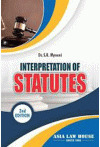- Author(s): Dr. S.R. Myneni
- Publisher: Asia Law House
- Edition: 2 Ed Rp 2024
- ISBN 13 9789388437288
- Approx. Pages 422 + Contents
- Format Paperback
- Approx. Product Size 24 x 16 cms
- Delivery Time 3-5 working days (within Kerala & South India) (Others 7-9 days)
- Shipping Charge Extra (see Shopping Cart)
.............................................................................................................................
Description
The subject of 'Interpretation of Statutes' has been introduced as a separate and independent subject for LL.B. (B.L.) students of Indian Universities. To say the fact, it deals with most important part of legal practice and useful for both Bench and Bar. However, it seems a dry and boring subject to learners. To make it interesting, the author tried to present it in a systematic step by step process and explained the concepts with case laws. The subject has been presented in Five Units. Unit I deals with 'Understanding Statutes and Interpretation'. Unit II deals with 'Basic Rules of Interpretation'. Unit III deals with 'Construction of Different Statutes'. Unit IV deals with 'External and Internal Aids and Presumptions of Interpretation' and Unit V deals with 'Effects of Changes in Statutes'.
............................................................................................................................
Contents
Unit I : Statutes and Interpretation
Chapter 1 : Meaning and Definition of Statutes
Chapter 2 : Classification of Statutes
Chapter 3 : Meaning and Definition of Interpretation
Chapter 4 : Rules of Construction under the General Clauses Act, 1897
Chapter 5 : General Principles of Interpretation [Rules of Statutory Interpretation]
Chapter 6 : Selected Maxims of Interpretation
Unit II : Basic Rules of Interpretation
Chapter 1 : Grammatical or Literal Rule of Interpretation
Chapter 2 : Golden Rule (or British Rule) of Interpretation
Chapter 3 : Mischief Rule of Interpretation
Unit III : Construction of Statutes
Chapter 1 : Interpretation of Penal Statutes
Chapter 2 : Interpretation of Statutes of Taxation
Chapter 3 : Beneficial Construction [Liberal Construction]
Chapter 4 : Construction to Avoid Conflict with Other Provisions [Rule Applicable in
Interpreting Two Conflicting Provisions in the Statute]
Chapter 5 : Doctrine of Harmonious Construction
Chapter 9 : Principles of the Civil Code
Unit IV : External and Internal Aids and Presumption of Interpretation
Chapter 1 : External Aids to Interpretation [Extrinsic or Extraneous Sources of Aids in
Construing a Statute]
Chapter 2 : Internal Aids to Interpretation
Chapter 3 : Presumptions
Chapter 4 : Construction most Agreeable Justice and Reason
Chapter 5 : Exceptional Constructions
Chapter 6 : Construction to Prevent Evasion and Abuse of Power
Chapter 7 : Intentions Attributed to the Legislature when It Expresses None
Unit V : Effects of Changes in Statutes
Chapter 1 : Effect of Repeal
Chapter 2 : Effect of Amendments to Statutes
Chapter 3 : Conflict between Parent Legislation and Subordinate [or Delegated] Legislation
Chapter 4 : Methods of Interpreting Substantive and Adjective or Procedural Laws
Chapter 5 : Interpretation of Constitution
Chapter 6 : Residuary Power under the Indian Constitution
Chapter 7 : Power of Parliament to Amend the Constitution
Chapter 8 : Directive Principles as Source of Constitutional Interpretation
Chapter 9 : Role of Judiciary
Chapter 10 : Judicial Activism
Chapter 11 : Definition of Judicial Restraint
Bibliography
Subject Index
............................................................................................................................
Author Details
Dr. S. R. Myneni
• Borm on 20-8-1939 at Lagadapadu, Guntur District, A.P. to Smt. Annapurnamma and Sri Butchaiah, hails from a respectable farmer's family.
• He had his Primary School Education at his native village; High School Education (1950-56) at Pedakurapadu; Teacher Training (1956-58) at Tadikonda, B.Ed. Training (1965) B.L. (1990-93) at Rajahmundry (AP). He has acquired his remaining qualifications from Intermediate (1960) to Ph.D. (1983) and LL.M (1993-95) from different Indian Universities by private appearance.
• He worked in Government Schools as Primary School Teacher (1958-66), Headmaster and Teacher Educator (1966-69). He officiated as an Extension Officer (Edn.) at Ongole Samithi (1969-74). He taught Economics as Asstt. Lecturer (1974-77), Lecturer (1977-87) Reader (1987-97) and also taught Mercantile Law (1999) in Government Colleges in AP.
• Registered as an Advocate of A.P. Bar Council (1998) and became Member of A.P. High Court Advocates Association (2001).
• His first book 'International Economic Law' was published in 1996 from then onwards nearly 60 text-books for B.A., LL.B.. and LL.M.. Courses, written by him were published by Allahabad Law Agency, Faridabad and Asia Law House, Hyderabad and some of them are prescribed by some Universities as textbooks.
• He visited Moscow (USSR) in 1985 and the US A in 1999.
• He has been associated with Friendship Associations and Peace Organization.
• He is the believer of altruism.
............................................................................................................................

